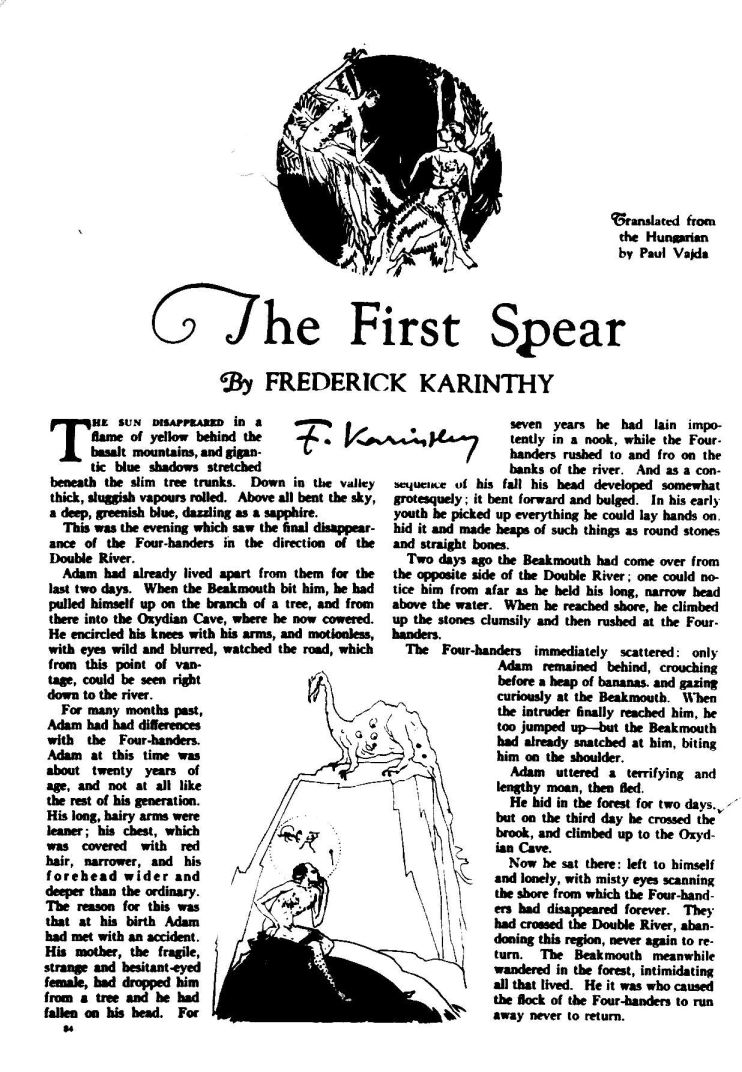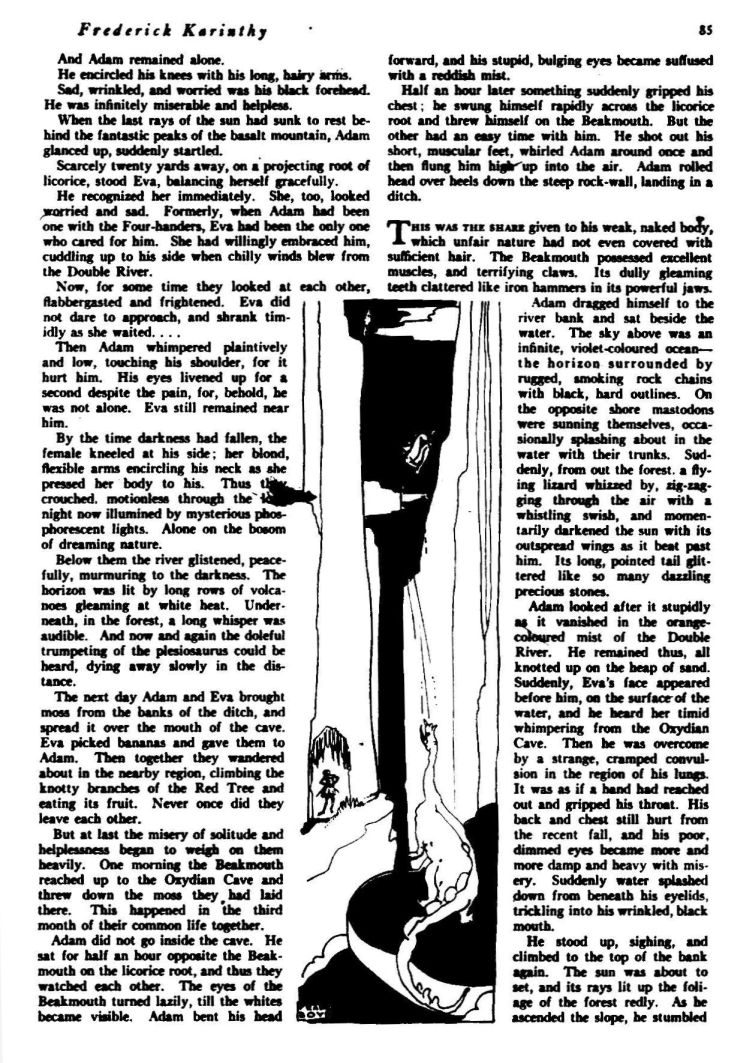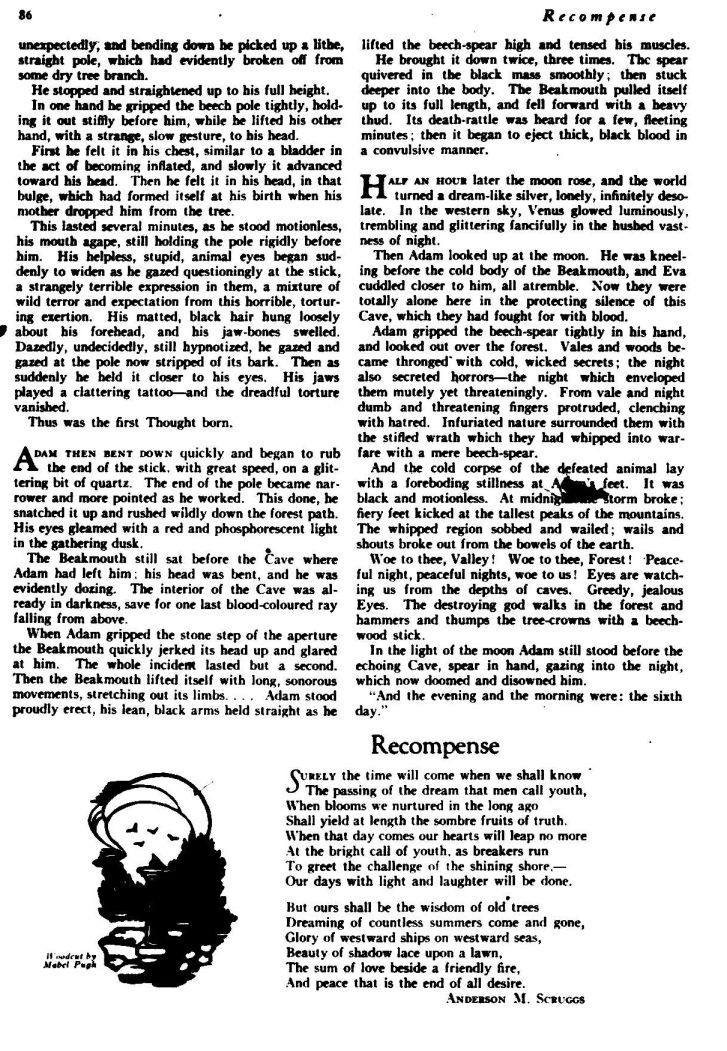
The sun disappeared in a flame of yellow behind the basalt mountains, and gigantic blue shadows stretched beneath the slim tree trunks. Down in the valley thick sluggish vapours rolled. Above all bent the sky, a deep, greenish blue, dazzling as a sapphire.
This was the evening which saw the final disappearance of the Four-handers in the direction of the Double River.
Adam had already lived apart from them for the last two days. When the Beakmouth bit him, he had pulled himself up on the branch of a tree, and from there into the Oxydian cave, where he now cowered. He encircled his knees with his arms, and motionless, with eyes wild and blurred, watched the road, which front this point of vantage, could be seen right down to the river.
For many months past, Adam had had differences with the Four-handers. Adam at this time was about twenty years of age, and not at all like the rest of his generation. His long, hairy arms were leaner; his chest, which was covered with red hair, narrower, and his forehead wider and deeper than the ordinary. The reason for this was that at his birth Adam had met with an accident. His mother, the fragile, strange and hesitant-eyed female, had dropped him from a tree and he had fallen on his head. For seven years he had lain impotently in a nook, while the Four-handers rushed to and fro on the banks of the river. And as a consequence of his fall his head developed somewhat grotesquely; it bent forward and bulged. In his early youth he picked up everything he could lay hands on, hid it and made heaps of such things as round stones and straight bones.
Two days ago the Beakmouth had come over from the opposite side of the Double River; one could notice him from afar as he held his long, narrow head above the water. When he reached shore, he climbed up the stones clumsily and then rushed at the Four-handers.
The Four-handers immediately scattered: only Adam remained behind, crouching before a heap of bananas and gazing curiously at the Beakmouth. When the intruder finally reached him, he too jumped up—but the Beakmouth had already snatched at him, biting him on the shoulder.
Adam uttered a terrifying and lengthy moan, then fled.
He hid in the forest for two days, but on the third day he crossed the brook, and climbed up to the Oxydian Cave.
Now he sat there: left to himself and lonely, with misty eyes scanning the shore from which the Four-handers had disappeared forever. They had crossed the Double River, abandoning this region, never again to return. The Beakmouth meanwhile wandered in the forest, intimidating all that lived. He it was who caused the flock of the Four-handers to run away never to return.
And Adam remained alone.
He encircled his knees with his long, hairy arms.
Sad, wrinkled, and worried was his black forehead. He was infinitely miserable and helpless.
When the last rays of the sun had sunk to rest behind the fantastic peaks of the basalt mountain, Adam glanced up, suddenly startled.
Scarcely twenty yards away, on a projecting root of licorice, stood Eva, balancing herself gracefully.
He recognized her immediately. She, too, looked worried and sad. Formerly, when Adam had been one with the Four-handers, Eva had been the only one who cared for him. She had willingly embraced him, cuddling up to his side when chilly winds blew from the Double River.
Now, for some time they looked at each other, flabbergasted and frightened. Eva did not dare to approach, and shrank timidly as she waited. . . .
Then Adam whimpered plaintively and low, touching his shoulder, for it hurt him. His eyes livened up for a second despite the pain, for behold, he was not alone. Eva still remained near him.
By the time darkness had fallen, the female kneeled at his side; her blond, flexible arms encircling his neck as she pressed her body to his. Thus they crouched, motionless through the long night now illumined by mysterious phosphorescent lights. Alone on the bosom of dreaming nature.
Below them the river glistened, peacefully, murmuring to the darkness. The horizon was lit by long rows of volcanoes gleaming at white heat. Underneath, in the forest, a long whisper was audible. And now and again the doleful trumpeting of the plesiosaurus could be heard, dying away slowly in the distance.
The next day Adam and Eva brought moss from the banks of the ditch, and spread it over the mouth of the cave. Eva picked bananas and gave them to Adam. Then together they wandered about in the nearby region, climbing the knotty branches of the Red Tree and eating its fruit. Never once did they leave each other.
But at last the misery of solitude and helplessness began to weigh on them heavily. One morning the Beakmouth reached up to the Oxydian Cave and threw down the moss they had laid there. This happened in the third month of their common life together.
Adam did not go inside the cave. He sat for half an hour opposite the Beakmouth on the licorice root, and thus they watched each other. The eyes of the Beakmouth turned lazily, till the whites became visible. Adam bent his head forward, and his stupid, bulging eyes became suffused with a reddish mist.
Half an hour later something suddenly gripped his chest; he swung himself rapidly across the licorice root and threw himself on the Beakmouth. But the other had an easy time with him. He shot out his short, muscular feet, whirled Adam around once and then flung him high up into the air. Adam rolled head over heels down the steep rock-wall, landing in a ditch.
This was the share given to his weak, naked body, which unfair nature had not even covered with sufficient hair. The Beakmouth possessed excellent muscles, and terrifying claws. Its dully gleaming teeth clattered like iron hammers in its powerful jaws.
Adam dragged himself to the river bank and sat beside the water. The sky above was an infinite, violet-coloured ocean—the horizon surrounded by rugged, smoking rock chains with black, hard outlines. On the opposite shore mastodons were sunning themselves, occasionally splashing about in the water with their trunks. Suddenly, from out the forest, a flying lizard whizzed by, zig-zagging through the air with a whistling swish, and momentarily darkened the sun with its outspread wings as it beat past him. Its long, pointed tail glittered like so many dazzling precious stones.
Adam looked after it stupidly as it vanished in the orange-coloured mist of the Double River. He remained thus, all knotted up on the heap of sand. Suddenly, Evaʼs face appeared before him, on the surface of the water, and he heard her timid whimpering from the Oxydian Cave. Then he was overcome by a strange, cramped convulsion in the region of his lungs. It was as if a hand had reached out and gripped his throat. His back and chest still hurt from the recent fall, and his poor, dimmed eyes became more and more damp and heavy with misery. Suddenly water splashed down from beneath his eyelids, trickling into his wrinkled, black mouth.
He stood up, sighing, and climbed to the top of the bank again. The sun was about to set, and its rays lit up the foliage of the forest redly. As he ascended the slope, he stumbled unexpectedly, and bending down he picked up a lithe, straight pole, which had evidently broken off from some dry tree branch.
He stopped and straightened up to his full height.
In one hand he gripped the beech pole tightly, holding it out stiffly before him, while he lifted his other hand, with a strange, slow gesture, to his head.
First he felt it in his chest, similar to a bladder in the act of becoming inflated, and slowly it advanced toward his head. Then he felt it in his head, in that bulge, which had formed itself at his birth when his mother dropped him from the tree.
This lasted several minutes, as he stood motionless, his mouth agape, still holding the pole rigidly before him. His helpless, stupid, animal eyes began suddenly to widen as he gazed questioningly at the stick, a strangely terrible expression in them, a mixture of wild terror and expectation from this horrible, torturing exertion. His matted, black hair hung loosely about his forehead, and his jaw-bones swelled. Dazedly, undecidedly, still hypnotized, he gazed and gazed at the pole now stripped of its bark. Then as suddenly he held it closer to his eyes. His jaws played a clattering tattoo—and the dreadful torture vanished.
Thus was the first Thought born.
Adam then bent down quickly and began to rub the end of the stick, with great speed, on a glittering bit of quartz. The end of the pole became narrower and more pointed as he worked. This done, he snatched it up and rushed wildly down the forest path. His eyes gleamed with a red and phosphorescent light in the gathering dusk.
The Beakmouth still sat before the Cave where Adam had left him: his beak was bent, and he was evidently dozing. The interior of the Cave was already in darkness, save for one last blood-coloured ray falling from above.
When Adam gripped the stone step of the aperture the Beakmouth quickly jerked its beak up and glared at him. The whole incident lasted but a second. Then the Beakmouth lifted itself with long, sonorous movements, stretching out its limbs. . . . Adam stood proudly erect, his lean, black arms held straight as he lifted the beech-spear high and tensed his muscles.
He brought it down twice, three times. The spear quivered in the black mass smoothly; then stuck deeper into the body. The Beakmouth pulled itself up to its full length, and fell forward with a heavy thud. Its death-rattle was heard for a few, fleeting minutes; then it began to eject thick, black blood in a convulsive manner.
Half an hour later the moon rose, and the world turned a dream-like silver, lonely, infinitely desolate. In the western sky, Venus glowed luminously, trembling and glittering fancifully in the hushed vastness of night.
Then Adam looked up at the moon. He was kneeling before the cold body of the Beakmouth, and Eva cuddled closer to him, all atremble. Now they were totally alone here in the protecting silence of this Cave, which they had fought for with blood.
Adam gripped the beech-spear tightly in his hand, and looked out over the forest. Vales and woods became thronged with cold, wicked secrets; the night also secreted horrors—the night which enveloped them mutely yet threateningly. From vale and night dumb and threatening fingers protruded, clenching with hatred. Infuriated nature surrounded them with the stifled wrath which they had whipped into warfare with a mere beech-spear.
And the cold corpse of the defeated animal lay with a foreboding stillness at Adamʼs feet. It was black and motionless. At midnight the storm broke; fiery feet kicked at the tallest peaks of the mountains. The whipped region sobbed and walled; wails and shouts broke out from the bowels of the earth.
Woe to thee, Valley! Woe to thee, Forest! Peaceful night, peaceful nights, woe to us! Eyes are watching us from the depths of caves. Greedy, jealous Eyes. The destroying god walks in the forest and hammers and thumps the tree-crowns with a beech-wood stick.
In the light of the moon Adam still stood before the echoing Cave, spear in hand, gazing into the night, which now doomed and disowned him.
“And the evening and the morning were: the sixth day.”



SOURCE: Karinthy, Frigyes [Frederick]. “The First Spear,” translated by Paul Vajda, The Golden Book Magazine, vol. 10, no. 55, July 1929, pp. 84-86.
Hopeless Love
by Frigyes
[Frederick] Karinthy,
translated by Paul Vajda
Frigyes & Ferenc Karinthy in English
Frigyes (Frederiko) Karinthy (1887-1938) en Esperanto
From Eden
to Cain: Unorthodox Interpretations & Literary Transformations:
Selected Bibliography
The Cavalier & Related Pulp Magazines: Covers & Contents
Home
Page | Site Map | What's
New | Coming Attractions | Book
News
Bibliography | Mini-Bibliographies | Study
Guides | Special Sections
My Writings | Other Authors' Texts | Philosophical
Quotations
Blogs | Images
& Sounds | External Links
CONTACT Ralph Dumain
Uploaded 26 January 2022
Site ©1999-2022 Ralph Dumain